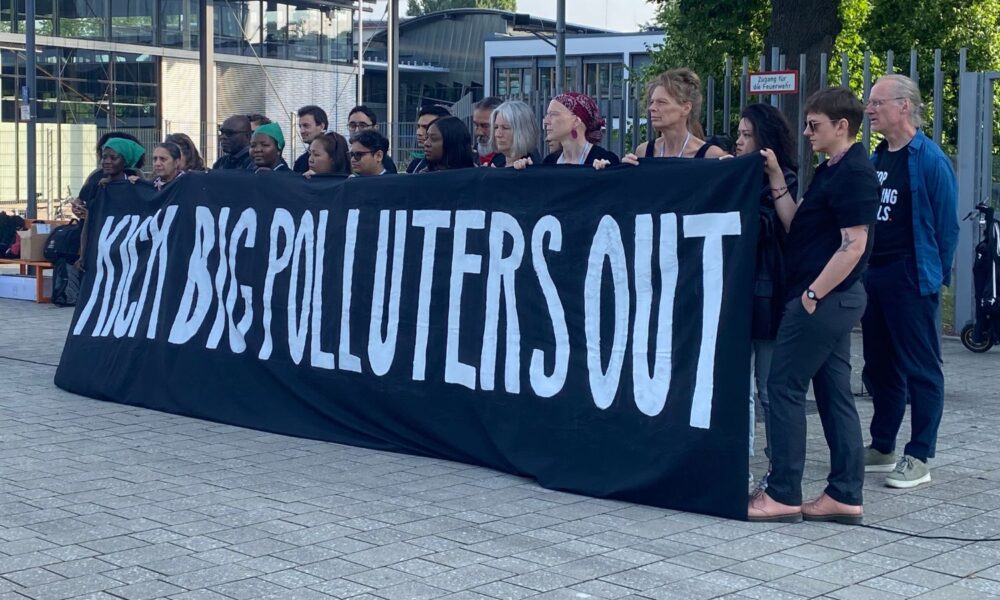As nations gather in Belém, Brazil for the international climate negotiations (known as COP30), the fossil fuel industry is emboldened and empowered by its dominant influence over the Trump Administration. At the same time, there is growing momentum to hold this industry accountable for its deception and the massive damage caused by its products and business model. With the world in danger of breaching 1.5° C of global warming and the Trump administration not sending a high-level delegation (having announced its intention to withdraw from the Paris climate agreement for the second time), COP30 will be a pivotal moment in global efforts to limit the worst impacts of climate change and advance a just transition centering workers, communities, and Indigenous Peoples.
Despite the commitment made two years ago at COP28 in Dubai to transition away from fossil fuels, the 2025 Production Gap Report shows that nations’ fossil fuel production plans are on track to be twice as much in 2030 as would be consistent with a 1.5° C pathway. And the annual Emissions Gap Report by the United Nations Environment Programme (UNEP) found that none of the more than 60 countries that have submitted pledges to reduce heat-trapping emissions have included targets to reduce oil and gas production or phase out inefficient fossil fuel subsidies.
Fossil fuel industry obstruction is one key explanation for this glaring omission. Just as the tobacco industry has a fundamental and irreconcilable conflict of interest with public health policymaking, the fossil fuel industry has a fundamental and irreconcilable conflict of interest with the development and implementation of public policies intended to limit fossil fuel-driven climate change and accelerate the transition to clean renewable energy.
What would it look like if the nations of the world came together to prevent the fossil fuel industry from obstructing science-informed public policy and its implementation? I decided to imagine what a COP free from fossil fuel industry influence would look like.
Safeguards against conflicts of interest
Since 2023, when COP delegates were first required to disclose their affiliations, the Kick Big Polluters Out coalition has counted thousands of fossil fuel lobbyists granted access to the negotiations. The industry’s presence has outnumbered the size of delegations of most nations—and eclipsed the representation of the most climate-vulnerable nations.
CEOs and lobbyists from BP, Chevron, ExxonMobil, Shell, and other major fossil fuel corporations have no place at the table where climate goals are being set and the transition to clean energy is being planned. An important new study underscores Big Oil’s conflict of interest: the largest 250 oil and gas companies only own about 1.42% of the global renewable energy capacity in operation, and may only produce 0.1% of their primary energy from renewable sources. The bottom line: these companies’ actual investment in clean energy is negligible compared to their massive fossil fuel extraction.
In a COP safeguarded against conflicts of interest, the nations most affected by extreme heat, sea level rise, and other climate impacts would not have to worry about their voices being drowned out by lobbyists from the industry primarily responsible for destructive and deadly climate change.
Science-informed decisionmaking
COP relies on science, including from the Intergovernmental Panel on Climate Change (IPCC), to inform its decisions. Even as the latest IPCC plenary meeting stalled on some key issues, the science is clear: climate action is far off track.
Of particular relevance to holding the fossil fuel industry accountable for its role in the climate crisis is attribution science, which is rapidly advancing—despite attacks from climate science deniers tied to fossil fuel interests. Here are a few recent examples:
- A peer-reviewed study led by my former UCS colleague Dr. Shaina Sadai built on and extended earlier research by quantifying not only the historical but also the long-term future contributions of major fossil fuel companies to sea level rise.
- A new study published in Nature presents the first systematic attribution of extreme heat events to the emissions of 180 fossil fuel and cement producers. Analyzing 213 major heatwaves that occurred between 2000 and 2023, the authors found that emissions traced to the major carbon producers account for roughly half of the observed increase in heatwave intensity since preindustrial times.
- Another 2025 Nature study provides a robust scientific basis for climate liability claims. Using an “end-to-end” attribution framework, the researchers link emissions from individual fossil fuel companies to specific economic harms caused by extreme heat between 1991 and 2020. For example, emissions traced to Chevron are associated with between $791 billion and $3.6 trillion in global heat-related losses.
Attribution science is showing how specific emissions have driven today’s climate impacts. In a fossil-free COP, this evidence would help shape policies rooted in evidence and fairness, not industry influence.
Polluter pays principle
Finance for cutting emissions, adaptation, and loss and damage remains a central issue in the COP process. Last year’s COP in Baku, Azerbaijan, failed to deliver an ambitious and much-needed climate finance commitment from richer nations for lower income countries.
Fossil fuel interests permeated COP29, and their push to maintain massive profits from oil and gas showed in the flawed final outcome. The final COP29 finance text made no explicit reference to the “polluter pays principle,” phasing out fossil fuel subsidies, or cutting investment flows to fossil fuels.
According to the 2025 report of the Lancet countdown on health and climate change, the health threats of climate change have reached unprecedented levels and “The escalating economic costs of climate change are becoming ever more visible, with profound implications for human health and societal stability.” To rebuild trust, wealthy nations that have built their economic power on fossil fuels must demonstrate their commitment to climate justice—which includes stepping up climate finance and making fossil fuel polluters pay an equitable share of the costs of:
- climate damages;
- climate adaptation; and
- the environmental, social, and systemic impacts of fossil fuel products and production.
This is the first COP after two landmark international court rulings that affirmed the right to a healthy climate and clarified that climate inaction is a violation of international law and that nations must regulate fossil fuel companies.
Climate justice means nations should ensure access to judicial remedies, including for extraterritorial climate impacts resulting from actions that occur within their borders or under their jurisdiction. Survivors of Super Typhoon Rai (locally known as Odette), which struck the Philippines in 2021, have announced legal action in the United Kingdom against Shell, seeking compensation for deaths and damages linked to the company’s role in driving the climate crisis. The survivors argue that Shell violated the Philippine constitutional right to a healthy environment and continued expanding fossil fuel operations despite internal documents acknowledging the catastrophic risks of climate change.
International cooperation for climate justice and accountability is especially vital now as the fossil fuel industry wields its influence with the Trump administration and the US Congress to lobby for a shield from liability for the harm caused by its products and business model.
Transparency and fair accounting
Disclosure and transparency are essential to the development, implementation, and enforcement of effective climate policies at all levels, from subnational to international. Seizing the advantage of a friendly US administration and Congress, fossil fuel corporations and their surrogates are attacking climate disclosure rules and attempting to shift how global warming emissions are calculated in an effort to dodge responsibility.
ExxonMobil, for example, lobbied aggressively against the European Corporate Sustainability Due Diligence Directive, a landmark law aimed at holding corporations accountable for human rights violations, environmental harms, and climate impacts in global supply chains. CEO Darren Woods has now leveraged his access to President Trump in an effort to defang the law before it takes effect.
At the same time, ExxonMobil is suing to block California’s agenda-setting climate disclosure laws, as my colleague Laura Peterson writes in her latest blog. Enacted in 2023, California’s laws require, among other provisions, disclosure of Scope 3 emissions.
Woods and ExxonMobil have also undertaken a crusade to change how Scope 3 emissions are calculated. Scope 3 encompasses emissions up and down a company’s value chain, including those produced from burning the company’s products—around 90% of the total for an oil and gas company. (The Trump administration is going a step farther, proposing a rule that would eliminate requirements for measuring and reporting carbon emissions for the vast majority of US industries, including fossil fuel producers and refiners).
Heading into COP30, ExxonMobil and the International Chamber of Commerce are among those kicking off a campaign to change carbon accounting. This system is favored by the oil and gas industry because it would shift responsibility for emissions from sold products from companies to consumers.
Information integrity
In the absence of transparency, disinformation can flourish. That’s why putting information integrity on the agenda at international climate meetings this year is a major breakthrough, as my colleague Kate Cell explains. November 12 is an official thematic day on information integrity, a cross-cutting objective on the Action Agenda of COP30.
The fossil fuel industry has been a key driver and beneficiary of disinformation and delayed climate action, as documented in the latest report by my team at the Union of Concerned Scientists, Decades of Deceit: The Case Against Major Fossil Fuel Companies for Climate Fraud and Damages.
Another compelling new resource is Climate Obstruction: A Global Assessment, which brought together nearly one hundred scholars and experts to advance our understanding of efforts by organized interests to slow or block policies on climate change. To equip actors to better recognize, anticipate, and respond to efforts that could undermine climate ambition, the Climate Social Science Network has published a policy brief on Climate Obstruction in the UN FCCC.
An international commitment to information integrity can support implementation and enforcement at the national level. Climate advocates are already seeing some success through litigation against greenwashing:
- Advocates in New Zealand recently secured a public apology from Z Energy after legal action. The petroleum retailer took out full-page ads in newspapers apologizing for “any confusion” caused by a greenwashing 2022 PR campaign that misrepresented its focus on alternative fuels and emissions reductions.
- A French court ruled that TotalEnergies misled the public with false claims about its path to carbon neutrality, marking the first use of France’s anti-greenwashing law against an energy company. The decision requires the company to remove misleading statements from its website and pay damages to the environmental groups that brought the case, signaling growing legal scrutiny of corporate climate claims in Europe.
Unfortunately, the COP30 hosts have hired a public relations firm that represents fossil fuel companies—and not for the first time. With this conflict of interest baked in, there is a real risk that the fossil fuel industry’s role in the climate crisis could be whitewashed—and the results of COP30 negotiations could be greenwashed.
Holding the line in Belém
On its own, a fossil-free COP process won’t solve the climate crisis or secure a people-centered just transition to a future rooted in rights, fairness, equity and solidarity. National and subnational policymakers, litigators, investors, business partners, communities, workers, Indigenous Peoples, consumers, and (of course) scientists all have key roles to play.
But COP30 is an opportunity for world leaders to increase pressure on the fossil fuel industry to stop lying, get out of the way of science-informed public policy, pay an equitable share of the costs they’ve imposed on all of us, and act to accelerate a fair and fast phaseout of fossil fuels. My colleagues in Belém and I will be watching closely over the next two weeks, urging the nations of the world to stand firm against the corrupting influence of the fossil fuel industry.

